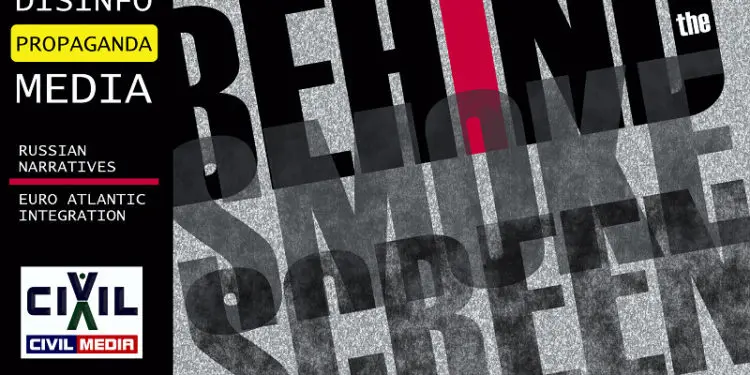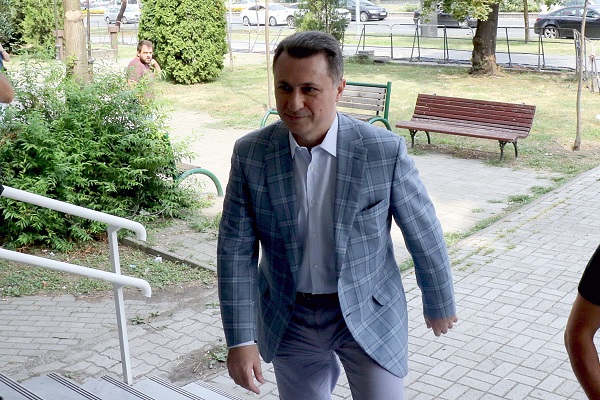The second panel discussion is taking place of the series “Behind the smokescreen”. The event is being broadcast live on Facebook and YouTube. The topic of the panel discussion is “Disinformation and propaganda in the media: Influence of pro-Russian narratives on the Euro-Atlantic orientation of North Macedonia”.
Participants in the event include university professor Nikola Dujovski PhD and journalists Ljubomir Kostovski from “Globus” and Dejan Andonovic from “Sloboden Pecat”. The event is led by Biljana Jordanovska, CIVIL.
Dejan Andonovic – Foreign policy editor, Sloboden Pecat
“Disinformation and propaganda in the media are manifested in such a way that false information reach people who consume that information and in some way their views on a certain event are distorted. In the case with the war in Ukraine, I must first say that as a journalist who follows the events from here through the media, I don’t see some disinformation, as our media too are practically guide by sources that come from Western agencies, are influenced, in my experience, from the Serbian media, which are under fierce attack, or inflow of Russian information media, hence, when our readers or listeners watch Serbian media directly, then there could be some, let’s say Russian influence. But if our citizens follow our media, then for sure there is no such influence, because my experience shows that all of us who are in editorials, carefully follow information. I must also point out another thing, as a journalist, and I have said this several times, regardless of everything, I think that it was not a good action to cut off the Russian media, because as journalists we cannot see the other side, which we as professionals will surely not be manipulated by their truth, but could have weighed things coming from the East and from the West.
However, Russian influence has managed to penetrate new media, above all, social media, where to a text that refers to Ukraine, Russia, Putin and so on, we have millions and millions of fake and real bots or real addresses or people who criticize the actions of the Prime Minister or the President in favor of Russia, and here a little pro-Russian influence can be seen. Or, if these are real people, then it’s clear to us why they are commenting it. If they are bots, then it’s another story that has nothing to do with the information, but are computers and informatics, says among other things Andonovic.
Ljubomir Kostovski – Editor in Chief, Globus
“I think that the Russian propaganda in our country is very strong, from around 2015, from the emergence of the so-called SDSM bombs and since then it can be seen that all of their reactions, following and comments have been very defensive in regards to the then current government. Within one of their divisions of the world, of old democratic countries, which are their let’s say political opponents, there are countries that are somewhere on the border, which treat us that way too, and which are supposed to be within what was devised in Moscow, the so-called “Orthodox Brotherhood”. In what was to dominate their interest, it was simply considered that we are some zone of interest, in which the West is trying through so-called “colored revolutions” to make changes to their detriment, in configuration of the interests. Certainly, Macedonia was here from the beginning of its aspirations to join NATO, and propaganda in our media is when you have no news. In our country, for example, there was absolutely no reporting on the actions of Russia in Greece, says Kostovski.
Dr. Nikola Dujovski – University professor
“From a security perspective, it concerns a truly serious problem and big challenge for our country, which after its NATO membership has serious obligations to build a security policy that is in line and the same with the other NATO member states. This intensified influence, or so-called hybrid war in the media, with fake news, started a decade ago, when relations between NATO and Russia began to seriously weaken. And from when it became clear that the partnership agreement between NATO and Russia is non-functional. We can look at the problem from a domestic perspective, and only for Macedonia, but surely, we must be aware that such issues are also regional issues, and not a single country in the region, not just those that are not members of NATO or the European Union, but also member states, are under serious influence of Russian misleading propaganda. Perhaps even more than in Macedonia.
I will make a short retrospective on what was happening in Montenegro before their full NATO membership, on all the types of fake news they were exposed to. A great part of the economic operators that operated in Montenegro withdrew, and just several days before the referendum for membership, a serious attempt for an attack on the government in Montenegro was prevented as well as an attempt for assassination. Which, later was reported more as a fake news than as truth, but, yes, there was serious influenced, points out Dujovski.
Diana Tahiri
Camera: Dehran Muratov
Producer and video-editor: Arian Mehmeti
Translation: N. Cvetkovska
















